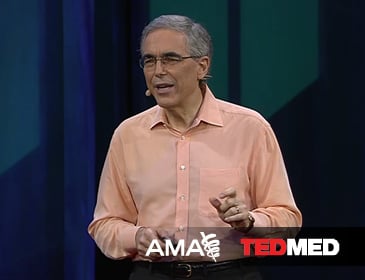It’s no secret that the health care environment and the way physicians practice medicine today is vastly different from only a few years ago—but what’s to come in the future? Jay Walker, TEDMED curator, shared what he believes are the five superforces that will radically change the practice of medicine. Walker discussed these superforces during TEDMED 2014, which took place earlier this month in San Francisco and Washington, D.C.
- How we see things. The future of medicine goes beyond X-rays and MRIs. “We cannot see a cancer tumor until it’s been growing inside us for at least six years,” Walker said. “Soon, we’ll spot them in six days. We’re going to have to reimagine what it means to see disease and, even more challenging, how we respond to what we see.”
- All the new data in the world. “Every second, our bodies generate new cells,” Walker said. “Imagine printing a brand new encyclopedia every minute, 10,000 pages long, all about you. Big data: We’re going to have to reimagine how we learn about our medical choices and how we deal.”
- Connected data streams. Telemedicine, global patient communities, real-time feedback of health—all are powerful and will affect how physicians practice. “We’re going to reimagine the speed, scale and scope of medicine,” Walker said.”
- People. “We’ve reached a critical mass of human brain power,” Walker said. “We’re going to reimagine how power and responsibility get distributed in health and medicine.”
- Synthetic biology. For the past 3 billion years, biological evolution was the only way life on this planet evolved or changed—until now. “Scientists and amateurs called ‘biohackers’ have the software that controls every form of life on earth,” Walker said. “[They’re] creating artificial DNA in labs, doing things evolution could never have done and never prepared us to deal with.”
In a later talk, Walker mentioned one more superforce that has the power to change the practice of medicine, and the one that is at the heart of every TEDMED talk: Imagination.
“[Imagination is] the unique ability of the human mind to visualize what does not yet exist,” Walker said. “We are not a community of specialists. We are a community that imagines.”
Watch Walker give his talks at TEDMED 2014: Visit the TEDMED 2014 website and enter invitation code “TMLicAMA14.” Once you’ve logged in to the on-demand streaming, find the “Vision Talk” video for Walker’s introductory talk. View his second talk by finding the “I was just thinking too small” video and advance to 1:22:10. View additional talks by other physicians, health care leaders and innovators through Oct. 10.
The AMA is a Global Institution Partner of TEDMED 2014, an association that makes this complimentary access to on-demand streaming possible.




